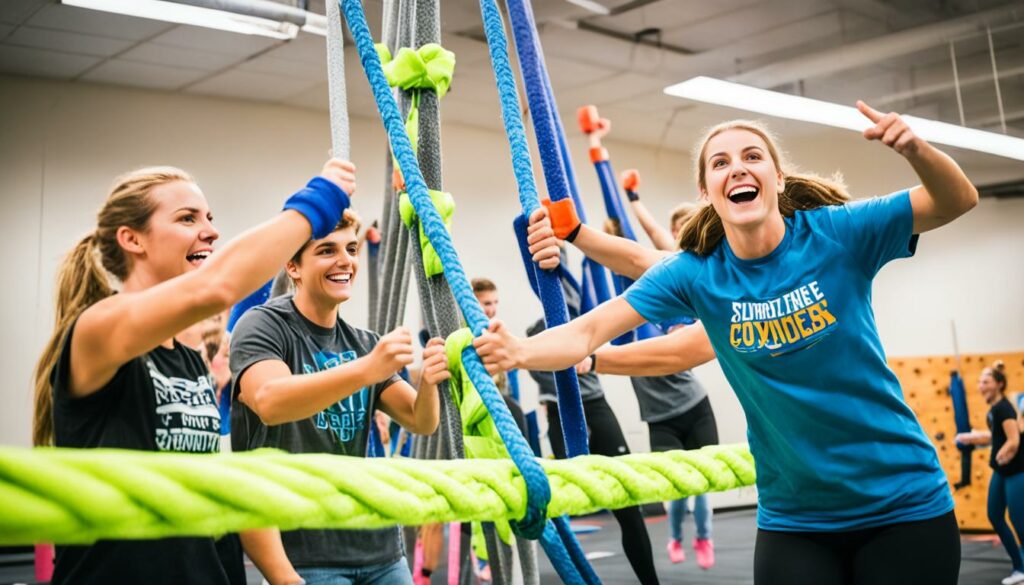Empowering Tips on How to Build Confidence in Teens
As parents, we understand the importance of helping our teenagers build confidence and develop a strong sense of self-esteem. The teenage years can be a challenging time, as our teens navigate through a myriad of changes and uncertainties. However, there are effective strategies that we can employ to empower and support our teens on their journey to self-belief and resilience.
Research and expert advice from various sources have shed light on practical tips for boosting teen confidence. By incorporating these strategies into our parenting approach, we can create an environment that fosters growth and instills confidence in our teens.
Key Takeaways:
- Recognize that the teenage years can be challenging for building confidence.
- Unconditional love and acceptance help nurture teens’ self-belief and resilience.
- Promote a growth mindset to boost self-confidence in adolescents.
- Embrace failure as a learning experience and an opportunity for growth.
- Focus on effort and the process rather than solely on outcomes.
Unconditional Love and Acceptance

Unconditional love and acceptance play a crucial role in nurturing teens’ self-belief and building resilience in adolescents. It is vital for parents to establish a foundation of unwavering love and acceptance for their teens, independent of their achievements or behavior. By emphasizing that love is not contingent upon grades, performance, or choices, parents create a safe space for teens to explore their identity and develop a strong sense of self-worth.
In this journey of building confidence, it is important to remember that mistakes and setbacks are part of life. Encourage your teen to embrace challenges and setbacks as opportunities for growth and learning. By reframing failures as valuable learning experiences, you are helping your teen develop the resilience they need to navigate the ups and downs of life.
One way to reinforce these concepts is by leveraging the power of quotes. Renowned psychologist Carl Rogers once said, “The curious paradox is that when I accept myself just as I am, then I can change.” This quote exemplifies the transformative nature of self-acceptance and highlights its connection to personal growth.
The Importance of Resilience
Building resilience in adolescents is crucial for their overall development and confidence. Resilience enables teens to bounce back from adversity, adapt to changes, and thrive despite challenges. By nurturing their resilience, parents equip teens with the tools they need to face life’s obstacles with confidence.
Here is a table outlining the key elements of building resilience:
| Key Elements of Building Resilience |
|---|
| 1. Foster a supportive and nurturing environment |
| 2. Encourage open communication and self-expression |
| 3. Cultivate problem-solving and decision-making skills |
| 4. Teach healthy coping mechanisms |
| 5. Develop a growth mindset |
| 6. Encourage self-care and stress management |
By focusing on these key elements, parents can help adolescents build resilience and face life’s challenges with confidence.
By nurturing unconditional love and acceptance and building resilience in adolescents, parents can empower their teens to develop a strong sense of self-belief. This foundation of confidence will enable them to overcome obstacles, embrace their true selves, and thrive in all areas of life.
Encouraging a Growth Mindset

Boosting self-confidence in adolescents and improving their self-worth is a crucial aspect of their development. One effective strategy for teen confidence building is to encourage a growth mindset. Many teens may believe that their abilities and intelligence are fixed traits, which can hinder their confidence and resilience. By promoting a growth mindset, teens can develop the belief that their abilities are not limited and that they have the capacity to learn and improve.
Neuroplasticity, the concept that our brains are constantly growing and changing, is a key element to discuss when encouraging a growth mindset. Explain to your teen that their brain has the remarkable ability to adapt and rewire itself throughout their life. This understanding can help them embrace challenges and setbacks as opportunities for growth rather than viewing them as personal failures.
“Having a growth mindset allows teens to understand that their current abilities and intelligence do not define them. It empowers them to believe in their potential for growth and instills confidence in their ability to overcome obstacles,” says Dr. Sarah Thompson, a renowned child psychologist.
It’s important to emphasize that effort and perseverance are the pathways to improvement. Encourage your teen to put in the necessary effort and embrace challenges that push them out of their comfort zone. By acknowledging the progress they make through their efforts, they can develop a stronger sense of self-belief and confidence in their abilities.
Strategies to Foster a Growth Mindset
Here are some strategies you can use to encourage a growth mindset in your teenager:
- Provide constructive feedback that focuses on effort, progress, and improvement rather than just outcomes.
- Expose them to inspirational stories of individuals who have overcome challenges through hard work and determination.
- Teach them about the brain’s plasticity and how it enables growth and learning.
- Encourage them to set realistic goals and create action plans to achieve them, emphasizing that setbacks are part of the learning process.
- Promote positive self-talk and help them reframe negative thoughts into opportunities for growth.
By fostering a growth mindset in your teen, you are equipping them with the mindset and tools necessary for building confidence and improving their self-worth. With perseverance and a belief in their own potential, they can overcome challenges and develop the resilience needed to thrive.
| Fixed Mindset | Growth Mindset |
|---|---|
| Believes abilities and intelligence are fixed | Believes abilities and intelligence can be developed |
| Avoids challenges and gives up easily | Embraces challenges and persists through obstacles |
| Afraid of criticism and feedback | Views criticism and feedback as an opportunity for growth |
| Feels threatened by others’ success | Is inspired by others’ success and sees it as a source of learning |
| Views effort as fruitless and unnecessary | Believes that effort is necessary for growth and improvement |
Embracing Failure as a Learning Experience

Mistakes and failures are inevitable parts of life, but they can be valuable learning experiences. Instead of focusing on the negative, encourage your teen to reframe their perspective and see failures as opportunities for growth and development. By nurturing their self-belief and resilience, they can confidently overcome obstacles and thrive in the face of adversity.
One effective way to navigate failures is by asking reflective questions. Prompt your teen to identify where things went off track, what influenced their decisions, and what they learned from the situation. This process of self-reflection helps them gain valuable insights and develop a stronger sense of self-awareness.
Reflective Questions:
- What choices did you make that led to this outcome?
- What could you have done differently?
- What have you learned from this experience?
- How can you apply these lessons to future situations?
By embracing failure as a natural part of the learning process, teens can build resilience and confidence. It teaches them that setbacks do not define their worth and that they have the ability to bounce back and grow from challenges.
Confidence-Boosting Activities:
- Encourage your teen to try new activities or hobbies that interest them.
- Support them in setting realistic goals and celebrating their progress.
- Provide opportunities for them to step out of their comfort zone and face challenges.
- Encourage them to surround themselves with supportive and positive influences.
- Promote a growth mindset, emphasizing the importance of effort and perseverance.
- Engage them in community service or volunteering to build empathy and confidence.
By participating in confidence-boosting activities, teenagers are able to develop and strengthen their belief in themselves, fostering a positive sense of self and nurturing their overall well-being.
Focusing on Effort and Process

When it comes to boosting self-confidence in adolescents and developing self-esteem in teenagers, it’s important to shift the focus away from solely evaluating the outcome of their achievements. Instead, it is essential to emphasize the effort, perseverance, and the process they go through to reach their goals. By acknowledging and praising their hard work, growth, and progress, you can nurture their self-esteem and confidence.
Praising effort and highlighting the process helps teenagers understand that success is not solely determined by the outcome, but also by the dedication and determination they put into their endeavors. This approach fosters a belief in their abilities and instills a sense of self-worth that is not solely tied to external achievements.
| Benefits of Focusing on Effort and Process: | Ways to Implement |
|---|---|
| 1. Reinforces the connection between hard work and success | – Encourage your teenager to set small goals and celebrate their progress along the way – Provide specific feedback on their effort and improvement – Express admiration for their dedication and commitment |
| 2. Cultivates a growth mindset | – Teach your teenager about the concept of neuroplasticity and how the brain can develop and learn – Encourage them to embrace challenges as opportunities for growth – Help them view failure as a natural part of the learning process |
| 3. Nurtures resilience | – Discuss the importance of perseverance and resilience in achieving long-term goals – Encourage your teenager to learn from setbacks and find alternate solutions – Remind them that setbacks are not indicators of personal worth, but rather opportunities for improvement |
The table above outlines some of the key benefits of focusing on effort and process, along with practical ways to implement this approach in supporting your teenager’s confidence-building journey. By recognizing and celebrating their efforts, you can help them develop a positive outlook on their abilities and cultivate a strong sense of self-confidence.
Encouraging Skill Development
During adolescence, teenagers experience significant brain growth and begin to explore new interests and passions. Encouraging skill development is essential in improving self-worth in teens and providing them with confidence-boosting activities. By helping your teenager identify areas where they may be struggling, you can empower them to view these challenges as opportunities for growth.
Support your teen in exploring new skills and activities that align with their interests. This will give them the chance to develop and sharpen their abilities, leading to a sense of mastery and competence. By engaging in activities they enjoy and excel in, teenagers can build their confidence and self-esteem.
One effective way to encourage skill development is to provide opportunities for your teen to participate in extracurricular activities or join clubs or organizations related to their interests. Not only will this enhance their abilities in specific areas, but it will also expose them to social interactions and teamwork, further contributing to their personal growth and self-worth.
Building Confidence Through Skill Development
Engaging in skill development activities can have a significant impact on teenagers’ confidence levels. As they learn and improve in their chosen pursuits, they develop a sense of accomplishment and a belief in their own abilities. This newfound confidence extends beyond the specific skill they are developing, empowering them to tackle challenges in other areas of their lives.
“Skill development can play a crucial role in enhancing teens’ self-worth and confidence. By encouraging them to explore new interests, we provide them with opportunities to discover their strengths and develop a sense of pride in their abilities.” – Dr. Sarah Johnson, Child Psychologist
In addition to encouraging structured skill development activities, it’s essential to foster an environment that supports your teen’s exploration and growth. Create space for them to pursue interests, try new things, and make mistakes without fear of judgment or failure. By emphasizing the process rather than focusing solely on the outcome, you can help them cultivate a growth mindset, where learning and improvement are valued above perfection.
| Key Benefits of Skill Development for Teens | Examples of Confidence-Boosting Activities |
|---|---|
|
|
Encouraging skill development in teens is a powerful way to improve self-worth and confidence. By providing support, opportunities, and a nurturing environment, you can help your teenager discover their passions, develop important life skills, and build a strong sense of self with the abilities they acquire.
Promoting Assertiveness and Communication Skills
Assertiveness and effective communication are crucial for nurturing teens’ self-belief and building confidence. By teaching them the strategies for teen confidence building, parents can empower their teens to express themselves confidently and navigate social interactions with ease.
One important aspect of assertive communication is mastering body language, tone of voice, and nonverbal cues. Teens should be encouraged to be aware of the messages they convey through their body language and how it affects their communication with others. They can practice maintaining eye contact, using open and relaxed body posture, and speaking clearly and confidently.
“It’s important for teens to recognize that their opinions and needs are valid and deserve to be heard,” says Dr. Emily Thompson, a renowned adolescent psychologist. “Encourage them to express their thoughts and beliefs in a respectful and assertive manner, while also being open to listening to others.”
To help teens develop assertiveness skills, parents can engage them in role-playing exercises where they practice assertive responses in various scenarios. This can include asking for help, setting boundaries, or expressing their opinions. By providing a safe environment to practice assertiveness within the comfort of their home, teens can gain confidence in their interpersonal interactions.
“Role-play activities can significantly enhance teens’ assertiveness skills by allowing them to experience different situations and responses,” says Dr. Sarah Collins, a leading expert in teen development. “It also offers an opportunity for parents to provide constructive feedback and reinforce positive communication behaviors.”
Additionally, engaging teens in group activities or workshops focused on communication skills can further enhance their assertiveness. These settings allow them to practice their communication skills with peers and learn from each other’s experiences.
To summarize, promoting assertiveness and effective communication skills is an essential strategy for nurturing teens’ self-belief. By teaching them the nuances of assertive communication, providing opportunities for practice, and engaging them in group activities, parents can help teens build confidence and navigate social interactions with confidence.
Cultivating a Supportive Home Environment
Create a supportive home environment where your teen feels comfortable discussing challenges and difficult situations. Encourage open and honest communication, allowing them to freely express their thoughts and emotions. Provide a safe space for them to explore their options and problem-solve, without judgment or criticism. Role model resilience and self-compassion in your own actions and words, showing them that setbacks are an opportunity for growth and learning.
A supportive home environment is crucial for building resilience in adolescents and nurturing teens’ self-belief. When teens feel safe and heard, they are more likely to develop the confidence to face challenges and overcome obstacles. This starts with establishing open lines of communication within the family.
“One of the greatest gifts parents can give their teens is a safe environment where they can freely express themselves without fear of judgment. By creating a supportive home environment, parents can provide their teens with the emotional support and encouragement they need to navigate the ups and downs of adolescence.”
Encourage regular family discussions where everyone gets the opportunity to share their thoughts and feelings. Create a judgment-free zone where ideas and opinions are respected, promoting a sense of belonging and acceptance. This will foster trust and strengthen the bond between parents and teens.
In addition, parents can lead by example. Demonstrating resilience and self-compassion in the face of challenges will teach teens that setbacks are a natural part of life and can be valuable learning experiences. Encourage teens to reflect on their experiences, identify lessons learned, and focus on personal growth.
Benefits of a Supportive Home Environment
A supportive home environment offers numerous benefits to the overall development of teens:
- Increased confidence and self-belief
- Enhanced emotional well-being
- Improved problem-solving and decision-making skills
- Strengthened resilience and ability to bounce back from adversity
- Positive relationships and communication with family members
Testimonials from Experts
“A supportive home environment plays a crucial role in building resilience in adolescents. When teens feel supported and understood, they are more likely to develop a strong sense of self-belief, which can empower them to overcome challenges and thrive.” – Dr. Sarah Johnson, Adolescent Psychologist
“Creating a safe and supportive home environment is vital for nurturing teens’ self-belief. It provides them with a solid foundation from which they can explore their own abilities, take risks, and develop into confident individuals.” – Dr. Mark Davis, Family Therapist
By cultivating a supportive home environment, parents can actively contribute to the growth and development of their teens’ resilience and self-belief. This supportive foundation will empower teens to face the world with confidence and resilience, knowing they have a safe haven to return to when they need it the most.
Conclusion
Building confidence in teens is a journey that requires patience, consistency, and support. By implementing the tips mentioned in this article, parents can empower their teens to develop healthy self-belief and resilience. Unconditional love and acceptance form the foundation for nurturing teens’ self-belief, while a growth mindset encourages them to embrace challenges and view failure as a learning experience.
It is also essential to focus on effort and process rather than solely on outcomes, praising your teen’s hard work and progress to nurture their self-esteem. Encouraging skill development and promoting assertiveness and communication skills further enhance their confidence and self-worth. Finally, fostering a supportive home environment where open and honest communication is encouraged allows teens to navigate challenges with resilience and self-compassion.
Empowering teens to build self-esteem requires consistent effort and guidance. By implementing these tips, parents can empower their teens to thrive in all areas of their lives, equipped with the confidence they need to face challenges head-on and believe in their own abilities.
FAQ
How can I build confidence in my teenage child?
Building confidence in teens is a process that requires patience and support. Some strategies you can try include providing unconditional love and acceptance, encouraging a growth mindset, embracing failure as a learning experience, focusing on effort and process, promoting skill development, and cultivating a supportive home environment.
Why is unconditional love important for fostering confidence in teens?
Unconditional love creates a safe space for teens to explore their identity and builds a strong foundation of self-worth. When teens know that their parents’ love and acceptance is not dependent on their achievements or behavior, they can develop a sense of security and confidence.
How can I promote a growth mindset in my teen?
You can promote a growth mindset by helping your teen understand that their abilities are not fixed, but can be developed with effort and practice. Encourage them to embrace challenges, view failures as opportunities for growth, and believe in their capacity to learn and improve.
How can embracing failure help my teen build confidence?
Embracing failure as a natural part of the learning process can help teens develop resilience and confidence in their ability to overcome obstacles. By reframing their perspective and focusing on the lessons learned from failures, teens can grow in confidence and develop a growth mindset.
Why is it important to focus on effort and process rather than just the outcome?
By praising your teen’s effort, perseverance, and the process they went through to achieve their goals, you reinforce the connection between hard work and success. This helps nurture their self-esteem and confidence, as they understand that their worth is not solely tied to achievements.
How can I encourage skill development in my teen?
Adolescence is a time of significant brain growth and exploration of new interests. Support your teen in identifying areas where they may be struggling and encourage them to see these challenges as opportunities for growth. Provide them with opportunities to develop and sharpen their skills, which can boost their confidence and foster a sense of mastery and competence.
How can I help my teen develop assertiveness and effective communication skills?
Teach your teen the nuances of assertive communication, including body language, tone of voice, and nonverbal cues. Encourage them to practice assertiveness in various situations, such as asking for help or expressing their opinions. Role-playing and providing opportunities for them to practice assertiveness within the safety of your home can help them build confidence in their interpersonal interactions.
How can I create a supportive home environment for my teen?
Create a supportive home environment by encouraging open and honest communication. Provide a safe space for your teen to freely express their thoughts and emotions, without judgment or criticism. Role model resilience and self-compassion in your own actions and words, showing them that setbacks are an opportunity for growth and learning.
What are some key tips for building confidence in teens?
Some key tips for building confidence in teens are providing unconditional love and acceptance, promoting a growth mindset, embracing failure as a learning experience, focusing on effort and process, encouraging skill development, promoting assertiveness and communication skills, and cultivating a supportive home environment.







